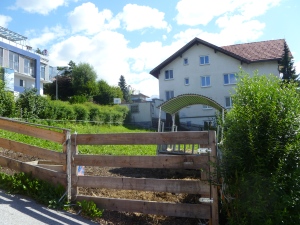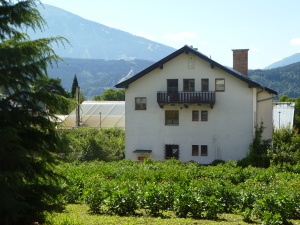We are pleased to share Elliot’s thoughtful writing and encourage you to read more of his work on his blog- Alternative Food Systems and Higher Ed.

Elliot Altbaum is graduating this spring from Clark University with a degree in Geography and is pursuing a masters in GIS from Clark. His interest in food issues started when he cooked weekly community dinners of soup and fresh bread. Through exposing others to new recipes and foods, and learning himself, he started to appreciate the enormous power of food in culture. After attending the national summit of the Real Food Challenge he was galvanized to study food academically by the passion and knowledge of the other students and activists. Elliot sees food as a common denominator among people and as a great theme around which most progressive movements can organize.
Resilience and Food Security (or what happens when the power goes out)
The storm last week that knocked out power for over 500,000 people provided a reminder about the vulnerabilities of our food system. I was out of power and refrigeration for 4 days. Disasters of all kinds can affect our ability to eat. Record droughts have reduced U.S grain harvests for multiple years in a row; floods can equally destroy whole harvests; a terrorist or military attack could warrant the closure of borders preventing food from coming in; a sharp rise in oil prices would cause prices to skyrocket, leaving some unable to afford food; and power outages can prevent adequate storage of food resulting in large scale spoilage. These possible shocks to the food system demand a resilient food system that will continue to provide food whatever the circumstance. To create such a system local, regional, national, and international producers of different scales have a role to play.
In philosophy and science there is a guiding principle called Occam ’s razor. It states that the least complex hypothesis is the better hypothesis. Generally speaking this principle suggests that the simplest explanation is usually the best. But what does this have to do with the food system? Well, a similar guiding principle would help improve our food system. Start with the simplest, most direct food sources. Start with local and simple food, adding complexity only when needed. Buying butter from a creamery in Minnesota or Wisconsin should easier than buying butter from a French creamery. But for stable foods like grains, regional distribution works fine. And in the case of New Orleans after Hurricane Katrina a national and international food system was absolutely necessary. We start with the most basic and work to the most complex.
But back to our topic of urban farms. How does urban farming, as the hyperlocal option, improve resilience? It improves resilience by being another tool in the set of food producers. There are certain challenges that urban farming is best suited to solve. Urban farming can provide fresh food when the power is out. I had a fresh salad every day my power was out because it stayed in the ground until I needed it, and that was just out of my garden. The farms in the city are harvesting broccoli, chard, kale, and peas. In 5 years when the next big power outage happens you will be able to walk down to the nearest urban farm and purchase milk for your morning cereal. No refrigeration needed!

Cow patch next to my friend’s apartment in Innsbruck, Austria.
Now maybe that farmer doesn’t want to build a little stand and sell their food each week. Instead that farmer sells to the nearest grocery store or coop. There the farmer’s food is sold with the butter from the dairy in Cannon Falls, the wheat from Belle Plaine, and the wild rice from the White Earth Reservation. And maybe a few avocados from California because they’re just so good. That urban farmer is playing an important role in the food system that keeps us all fed in all circumstances.
The cow’s view. A house with a greenhouse and farm up to the backdoor.
When oil and other hydrocarbons become scarce (which they will and must, but a topic for another day) urban and local farming are good solutions. Intense urban farming uses little hydrocarbon but can grow lots of food. Cuba is the only country to go through an intense and complete oil crises and come out the other side. In fact few countries have ever experienced such a sudden decrease in oil use. Cuba had had a preferential deal with the USSR where Cuba got cheap oil in exchange for sugar, bellicose language and being a thorn in the side of the U.S. With the collapse of the USSR, and the U.S embargo still in place, Cuba had no place to turn. No oil for running tractors and no petroleum based fertilizers. Agriculture collapsed. The years following were hard and painful, but the government and the Cuban people stepped up to the plate.
Cuba reinvented its agriculture. Oxen breeding programs were reinstated, farmers were among the most prized professions, and scientists devoted all energy to researching organic fertility and pest management. This was not accomplished without much pain and sacrifice. Cuba went, almost overnight, from a highly mechanized, industrial food system to almost nothing. There was no safety net. No built in redundancy. The system was not resilient. It took them years to start building enough capacity and knowledge to run the system effectively. Havana now has an extensive network of “organoponicos” that provide 90% of the fresh produce for the city.
Let’s start the research now. We can build the capacity now by training farmers who can train more farmers. It is going to take a while to figure out who needs to talk with whom. How compost should be handled. How the city should handle land access. We are lucky to live in a city and a state with agricultural roots. People still know how to farm. There is even a land-grand university right here in the Twin Cities. In fact as a kid I went to Farm in the City summer camp at the St. Paul campus and milked a cow. Let’s do the hard work now while we have the luxury of the national and international food system.
 University of Minnesota, St. Paul Campus. A field research site.
University of Minnesota, St. Paul Campus. A field research site.




Pingback: A Resilient Food System and Urban Agriculture - A Look Back - Worcester Food Policy Council
[…] Resilience and Food Security: A Guest Post by Elliot Altbaum […]